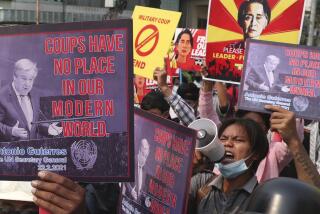Madagascar Leader Extends State of Emergency
- Share via
ANTANANARIVO, Madagascar — President Didier Ratsiraka on Tuesday extended the country’s state of emergency for a second time, hoping to outlast political rivals who have already declared themselves in power.
Ratsiraka’s order extends the state of emergency another two weeks in the capital of Antananarivo and two neighboring provinces.
The order bans public assemblies and imposes censorship and curfews, but all the restrictions have been widely ignored by the emboldened opposition in this island nation of 10 million residents 250 miles off the coast of southeastern Africa.
Ratsiraka remained holed up in his fortified presidential palace Tuesday, a day after the six-party opposition coalition declared that they had stripped him of authority and taken over power.
The standoff continued, with the streets of this capital calm and Ratsiraka--in power since 1975--not making any appearances on television.
Opposition leaders have suspended their daily rallies, which regularly attract tens of thousands, until Thursday, when provincial leaders are to appear in a show of solidarity against Ratsiraka.
Benoit Rabemanantsoa, secretary general of the Interior Ministry, told foreign journalists Tuesday that the changes demanded by the opposition are the same kinds of changes Ratsiraka has been trying to implement--an interim government followed by democratic elections.
Rabemanantsoa also claimed that the army remains neutral, despite a statement by military commanders this week supporting the opposition demands for new elections.
Speaking to a cheering crowd on Monday, the Rev. Richard Andramanjato, an opposition spokesman, announced the “dismissal” of Ratsiraka and “the suspension of all the republic’s institutions.”
Andramanjato declared a transitional government had been formed by the coalition fighting to end Ratsiraka’s 16-year rule.
The declaration seemed to be backed up by the opposition’s possible alliance with the military against Ratsiraka’s attempt to divide the island into six independent republics.
Ratsiraka stayed in his palace protected by his North Korean-trained guard and showed no indication of relinquishing power.
The 2-month-old crisis between the opposition and Ratsiraka came to a head when his presidential guard opened fire Aug. 10 on 400,000 protesters marching on the palace. The Madagascar Red Cross confirms that 31 people were killed.
Since then, the country’s military, religious and government leaders have distanced themselves from Ratsiraka, elected to a third seven-year term in 1989 in balloting that opponents charge was riddled with fraud.
Military leaders said they opposed the move by Madagascar’s six provinces over the weekend to become federal states with Ratsiraka at their head. The opposition is strongest in Antananarivo, and the federalization of the provinces was seen as a bid by Ratsiraka to isolate his opponents.
Last month, the opposition declared a shadow government and installed its ministers in government buildings. Ratsiraka imposed the state of emergency and briefly detained several shadow ministers.
More to Read
Sign up for Essential California
The most important California stories and recommendations in your inbox every morning.
You may occasionally receive promotional content from the Los Angeles Times.













